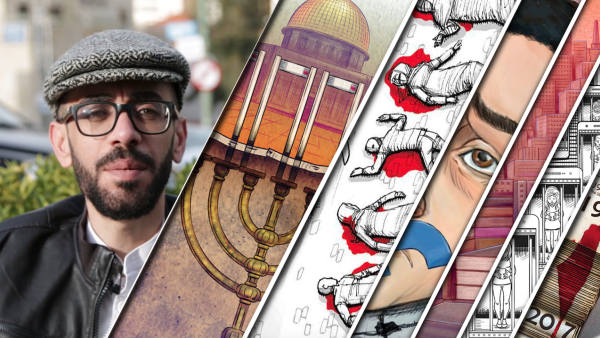by Salim Essaid
Provocative is one way to describe Latif Fityani, he’s an emerging satirical artist in Jordan who digitally creates drawings or images that say something.
With that Latif doesn’t consider his work to be reaction-baiting, he describes it as attention grabbing with a purpose ---to convey an important message and make the viewer question their pre-established point of view and challenge mainstream narratives.
Yet speaking out doesn’t come without its price. He’s faced backlash for his art locally and internationally. Latif said he’s been sued in Jordan for his art, and temporarily banned from Facebook for posting about Palestinian issues, a topic close to his heart.
(Latif Fityani)
Jordan already has a community of established caricaturists founded by the late Jalal Al-Rifai along with other renowned caricaturists such as Amjad Rasmi from al-Sharq al-Awsat newspaper, and more.
Al Bawaba spoke to Latif, who has been in the satirical art scene for only a few years professionally but wants to reach a wider audience in the West and challenge mainstream ideas about the Middle East.
----------------------------
How did you get into this type of work?
“In 2015 I started drawing professionally, as in getting paid for cartoons. Making fun of all kinds of stuff, you know.
I’ve been a freelancer for the past 10 years or so. So I had lots of time, I drew from even before. What happened is that I got an opportunity through which I could draw about all kinds of topics that people care about. Especially political issues, you know in the Middle East. It’s like the hub of politics all over the world you know.
So that’s when I thought I could actually talk about you know, topics and issues that concern people you know."
----------------------------
There are other ways to express political views. Why did you select political satire and artistry to do that?
“It was actually the social media thing you know, I mean social media was all over the place. We are using social media, like before if you work in a newspaper or something, you’re going to draw about topics that you think needs to fixed or you think needs some more focus, you know.
But with social media you don’t have to buy a newspaper so for me it was like this is a new atmosphere through which you’d be able to talk about those stuff especially like the Palestinian cause, you know, which is like one of the main issues. And the thing is that I’ve been thinking like you know the mainstream media for me it was more like I was trying to deliver messages to the Western community. (the) mainstream media was already controlled, let’s say, it was already controlled by the other side of the struggle.
So I thought social media would be a good way or a good mean or a good tool to represent our point of view, you know, so I thought that’s good. That’s one thing, another thing… most of the people enjoy seeing, stuff visual stuff, (more) than reading [...].
----------------------------
What has been the impact? Have you gotten responses whether good or bad to your work? Have you received any feedback?
“I’ve been having some good reviews, some good feedback. I think somehow even it was a very small, let’s say, portion of people I think somehow I made them see our point of view. I can see that through comments and through followers from the West, you know. I was approached by Cartoon Movement for example and I’ve been publishing cartoons through them. I’ve been approached by other platforms in the West like by Germany and Brazil and in the United States and they weren’t Arab, from Arab origins or anything.”
----------------------------
What have they told you?
“They were seeing that this is something helpful in our causes, the Palestinian cause, or anything that concerns Muslims all over the world. Cause actually I’ve been drawing all kinds of stuff concerning Arabs and Muslims. In a way that I think knows how to approach, you know, or that knows how to let’s say address Western audience and Western social media.
You don’t get someone who’s not already interested in politics It’s not like magic, you’re not going to make him convert. It wouldn’t make him into politics [...].
Now it’s good enough for me to have them see our point of view. Some of the people… Now once you get their attention then they’re open to discussions.
They ask questions. They start questioning the mainstream media, they start questioning ideas that they used to have from before because now you’re giving them a different point of view.
I wouldn’t say that it would make them interested in politics suddenly or that they’re going to become pro-Palestinian or pro-Arabs or pro-Muslims or whatever. What you’re doing is just making some kind of a balance that this is our side of the story that deserves to be looked at.”
----------------------------
What has the impact been on social media?
“It’s true I’ve been reaching and trying to reach even further for the Western community and it’s been good enough but the main change has been locally first of all. I’m the newest as a cartoonist, other cartoonists have been there, I don’t know, 10, 15 years ago but I was doing cartoons in a different way let’s say. I think locally I’ve been making lots of success, internationally I’ve been trying and hopefully I will get even more attention.”
----------------------------
Can you give some examples of these bold statements you’ve made through your art?
“Many of the cartoons about Palestine have gotten some good exposure in the West. They weren’t bold or anything, they were just telling the truth. There was this cartoon, shoot, take a knife, take a photo as in they have been claiming many times that young Palestinians are trying to stab a soldier or something and then they shoot them and then they take photos of them with a knife laying next to the already shot person.
And actually we saw it in many videos where they were planting you know knives next to victims as in just to give a clear message that he was trying to stab a soldier. And he got shot, because of that… this is one of the cartoons that were exposing you know the IDF.
----------------------------
Another one, please?
“The wall… the Donald Trump wall… you know the wall between the United States and Mexico, I think I made a good cartoon about that as well.
It was also talking about the statue of liberty as in the statue of liberty is brought down, smashed into pieces and building the wall through the pieces of the statue of liberty.
So I was trying to give some kind of a scene similar to what we would imagine if we thought about building the pyramids you know.
If you think about building the pyramids, it was slaves dragging huge stones and that… so this is what came to my mind.
It’s a scene that’s exactly similar to how it would look while building the pyramids thousands of years ago.”
----------------------------
Has the locally community in Jordan expressed how your work has affected them, given that you’re bringing something new?
“I think I managed to do so. Somehow I’m trying to make references through things that young adults see familiar. If you’re 18 or 19 or 20 you’re probably not interested in politics you know, or any serious topics, you don’t need that at this age. But if you manage to do it in a smart way as in give them a reference they think they could relate to you can get their attention.
I could claim that I actually managed to make many people fans of cartooning and caricature and I think that I managed to make them more into politics, you know. I could say so.
This is one thing. Another thing is that, I’ve been making some… many times some very bold cartoons. It’s not my intention to make them controversial but I think that I did practice my right of freedom of speech and I wasn’t afraid to use examples and bold visual references and bold ideas and I think people weren’t used to such kinds of stuff.”
----------------------------
Can you give an example of art you have made about local Jordanian issues?
“We have this organization in Jordan [...] Social Security. I actually made fun of their logo based on their policies. When they want you to pay, their logo is a palm of a hand it’s like that you know, you can think of that as giving or taking.
Social Security Logo - When they want it from you - When you want it from them
(Latif Fityani)
For me it was taking, now this is when they want money from you, but when you’re retired and you need your money back, you know, the logo would change into this (raises middle finger, palm facing up and fingers extended) which is the middle finger which is the way that it’s used in the Middle East.”
----------------------------
What do you hope your work becomes in the future? What impact do you want it to have on social media, the world?
“I would like my artworks to spread even further, and to have more exposure cause actually I think we need more people to talk about our side of the story. To tell the story in our own words, in my case in our own artworks, instead of having others you know telling our story the way it would serve their purposes.”







